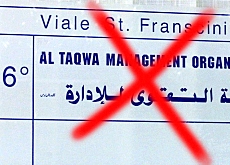
Prosecutors drop terror investigation

The Swiss authorities have halted a three-and-a-half-year investigation into a now-defunct Swiss-based financial firm suspected of ties to al-Qaeda.
The decision follows a court ruling in early May that federal prosecutors had to bring charges by the end of the month or drop the case.
“We did everything we could,” said Claude Nicati of the Federal Prosecutor’s Office on Wednesday, referring to the aborted investigation of Nada Management, formerly known as al-Taqwa.
The US government had accused al-Taqwa, which was founded in 1988 by its Egyptian managing director, Youssef Nada, and his Syrian associate, Ali Himmat, of helping to fund Osama bin Laden’s terrorist network.
American officials claimed al-Taqwa sent al-Qaeda money through Malta and Switzerland to banks in the Bahamas.
Nicati said the failure to get hold of details about al-Taqwa’s accounts in the Bahamas was ultimately the decisive factor.
“The Bahamas never gave a usable response to Swiss requests for judicial assistance,” said the deputy federal prosecutor.
Nicati added that he even made two visits to Saudi Arabia to look for the bank records because one of the suspects told Swiss investigators that the al-Taqwa books had been transferred to the Saudi capital, Riyadh.
But Nicati said he was unable to find anything.
“Without this information, we had no chance in front of the Federal Criminal Court,” he added.
“Even if very serious doubts remain about the two accused, the evidence is simply not good enough to convince the court.”
Documents supplied by the Americans to back up their allegations also failed to give the Swiss case any substance.
Immediate suspicions
Al-Taqwa had been under investigation since shortly after the terror attacks on Washington and New York on September 11, 2001.
Swiss officials froze 24 Nada bank accounts and searched company officials’ homes and offices on November 7, 2001 – the same day that the organisation was accused by Washington of financing terrorist acts.
The company operated out of the southern canton of Ticino until it was liquidated in December 2001.
Nada and Himmat repeatedly denied any connection with Osama bin Laden and his al-Qaeda network and accused the Swiss authorities of taking part in an American-led anti-Muslim campaign.
“Of course I am happy,” said 74-year-old Nada, who declined to say more.
Himmat, 66, said he was “very happy” to learn of the decision to close the case.
“I was confident that the Swiss authorities would find out that I’ve never done anything wrong.”
Their bank accounts remain blocked, however, owing to UN sanctions.
Court pressure
Last month the Federal Criminal Court ruled that prosecutors should have given further reasons for the allegations made against Lugano-based Nada Management and its director in 2001.
It added that Nada, who has been demanding an end to proceedings since 2002, should have been advised of specific charges.
The court also said there was no reason for the prosecutor’s office to have taken so long to decide whether to hand the case over to a tribunal.
It also criticised prosecutors for claiming late last year that they were about to launch judicial proceedings.
The prosecutor’s office was ordered to pay SFr3,000 ($2,514) in damages to Nada.
swissinfo with agencies
September 15, 2001: federal prosecutor launches investigation following the attacks in the United States.
October 24, 2001: investigation is extended to include the activities of Nada Management.
November 7, 2001: Swiss police raid the company’s premises and seize documents.
May 2004: investigation still in its preliminary phase, with no judicial proceedings launched.
May 2005: Prosecutors are given until the end of the month to decide whether to pursue the case.
June 1, 2005: Prosecutors halt investigation due to lack of evidence.

In compliance with the JTI standards
More: SWI swissinfo.ch certified by the Journalism Trust Initiative

























You can find an overview of ongoing debates with our journalists here . Please join us!
If you want to start a conversation about a topic raised in this article or want to report factual errors, email us at english@swissinfo.ch.